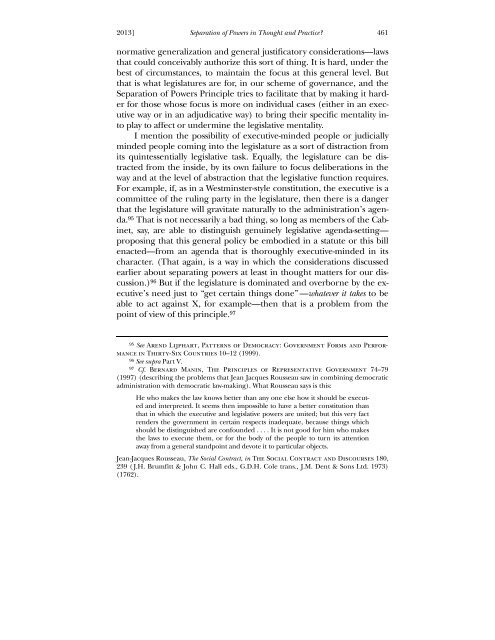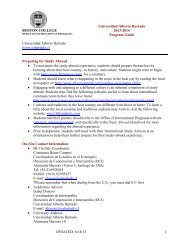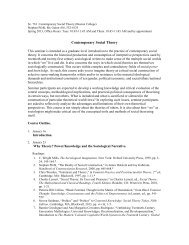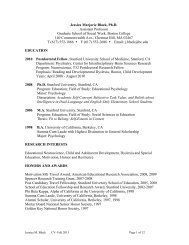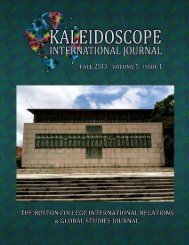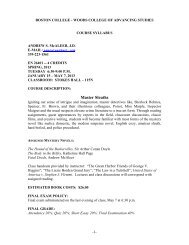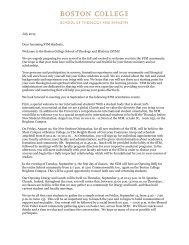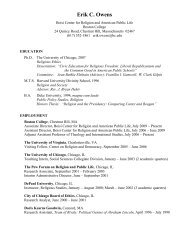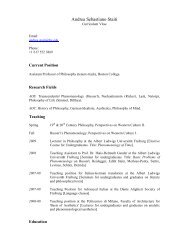separation of powers in thought and practice? - Boston College
separation of powers in thought and practice? - Boston College
separation of powers in thought and practice? - Boston College
You also want an ePaper? Increase the reach of your titles
YUMPU automatically turns print PDFs into web optimized ePapers that Google loves.
2013] Separation <strong>of</strong> Powers <strong>in</strong> Thought <strong>and</strong> Practice? 461<br />
normative generalization <strong>and</strong> general justificatory considerations—laws<br />
that could conceivably authorize this sort <strong>of</strong> th<strong>in</strong>g. It is hard, under the<br />
best <strong>of</strong> circumstances, to ma<strong>in</strong>ta<strong>in</strong> the focus at this general level. But<br />
that is what legislatures are for, <strong>in</strong> our scheme <strong>of</strong> governance, <strong>and</strong> the<br />
Separation <strong>of</strong> Powers Pr<strong>in</strong>ciple tries to facilitate that by mak<strong>in</strong>g it harder<br />
for those whose focus is more on <strong>in</strong>dividual cases (either <strong>in</strong> an executive<br />
way or <strong>in</strong> an adjudicative way) to br<strong>in</strong>g their specific mentality <strong>in</strong>to<br />
play to affect or underm<strong>in</strong>e the legislative mentality.<br />
I mention the possibility <strong>of</strong> executive-m<strong>in</strong>ded people or judicially<br />
m<strong>in</strong>ded people com<strong>in</strong>g <strong>in</strong>to the legislature as a sort <strong>of</strong> distraction from<br />
its qu<strong>in</strong>tessentially legislative task. Equally, the legislature can be distracted<br />
from the <strong>in</strong>side, by its own failure to focus deliberations <strong>in</strong> the<br />
way <strong>and</strong> at the level <strong>of</strong> abstraction that the legislative function requires.<br />
For example, if, as <strong>in</strong> a Westm<strong>in</strong>ster-style constitution, the executive is a<br />
committee <strong>of</strong> the rul<strong>in</strong>g party <strong>in</strong> the legislature, then there is a danger<br />
that the legislature will gravitate naturally to the adm<strong>in</strong>istration’s agenda.95<br />
That is not necessarily a bad th<strong>in</strong>g, so long as members <strong>of</strong> the Cab<strong>in</strong>et,<br />
say, are able to dist<strong>in</strong>guish genu<strong>in</strong>ely legislative agenda-sett<strong>in</strong>g—<br />
propos<strong>in</strong>g that this general policy be embodied <strong>in</strong> a statute or this bill<br />
enacted—from an agenda that is thoroughly executive-m<strong>in</strong>ded <strong>in</strong> its<br />
character. (That aga<strong>in</strong>, is a way <strong>in</strong> which the considerations discussed<br />
earlier about separat<strong>in</strong>g <strong>powers</strong> at least <strong>in</strong> <strong>thought</strong> matters for our discussion.)96<br />
But if the legislature is dom<strong>in</strong>ated <strong>and</strong> overborne by the executive’s<br />
need just to “get certa<strong>in</strong> th<strong>in</strong>gs done” —whatever it takes to be<br />
able to act aga<strong>in</strong>st X, for example—then that is a problem from the<br />
po<strong>in</strong>t <strong>of</strong> view <strong>of</strong> this pr<strong>in</strong>ciple.97<br />
95 See Arend Lijphart, Patterns <strong>of</strong> Democracy: Government Forms <strong>and</strong> Performance<br />
<strong>in</strong> Thirty-Six Countries 10–12 (1999).<br />
96 See supra Part V.<br />
97 Cf. Bernard Man<strong>in</strong>, The Pr<strong>in</strong>ciples <strong>of</strong> Representative Government 74–79<br />
(1997) (describ<strong>in</strong>g the problems that Jean Jacques Rousseau saw <strong>in</strong> comb<strong>in</strong><strong>in</strong>g democratic<br />
adm<strong>in</strong>istration with democratic law-mak<strong>in</strong>g). What Rousseau says is this:<br />
He who makes the law knows better than any one else how it should be executed<br />
<strong>and</strong> <strong>in</strong>terpreted. It seems then impossible to have a better constitution than<br />
that <strong>in</strong> which the executive <strong>and</strong> legislative <strong>powers</strong> are united; but this very fact<br />
renders the government <strong>in</strong> certa<strong>in</strong> respects <strong>in</strong>adequate, because th<strong>in</strong>gs which<br />
should be dist<strong>in</strong>guished are confounded . . . . It is not good for him who makes<br />
the laws to execute them, or for the body <strong>of</strong> the people to turn its attention<br />
away from a general st<strong>and</strong>po<strong>in</strong>t <strong>and</strong> devote it to particular objects.<br />
Jean-Jacques Rousseau, The Social Contract, <strong>in</strong> The Social Contract <strong>and</strong> Discourses 180,<br />
239 ( J.H. Brumfitt & John C. Hall eds., G.D.H. Cole trans., J.M. Dent & Sons Ltd. 1973)<br />
(1762).


